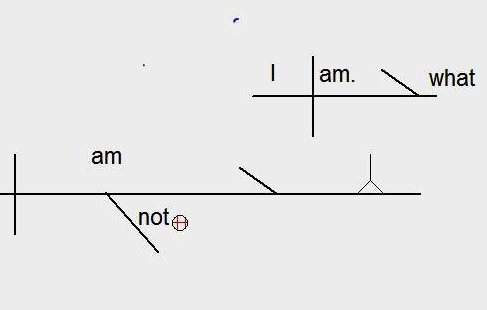
One of my favorite lines in any Shakespeare play comes from my favorite character: Iago, of course. In Act I Scene i of Othello, Iago concludes a long speech to a seemingly inattentive Roderigo with this little gem:
“I am not what I am.”
Wait, what? No Fear Shakespeare—the Sparknotes guide that translates Shakespeare into “the kind of English people actually speak today”—graciously glosses this as “I am not what I appear to be,” but he doesn’t really say that does he? No, he doesn’t; he says he is not who he is. This is not a question of weird/scary Elizabethan English.
In fact, as any high school math nerd can tell you, the sentence is a paradox, a claim that negates itself. According to old school philosophy of language that means that this sentence is meaningless, and it certainly seems that way to my students when I teach Othello. But of course in the very act of saying something so self-negating, so critical and (possibly) so meta-dramatic tells us a whole lot about Iago the character, Iago the device, and Iago the representation of non-being, of skepticism.
The opposite of this sort of paradox is a tautology: a statement so obviously true that it provides no new information about the world. The version of this that I most often encounter comes while grading literature papers: “In The Great Gatsby [or insert title here], the author uses imagery to explore themes.” The identity-tautology that Iago is riffing on, though, comes from Exodus (3:14), as a decent annotated edition will tell you. That’s right, God/Yahweh answers Moses’ pretty straightforward “what’s your name” question with “אֶהְיֶה אֲשֶׁר אֶהְיֶה,” which usually translates to “I am that I am.” One tradition of Judaism designates this sentence as one of the mystical Seven Names of God, which gives the speaker a good out for not being very helpful to Moses. It also provides a nice context for Iago, who arguably has some negated-God shit going on.
But I want to go beyond the meta-dramatic and the theological: what do these statements of (non)-identity say on a structural level? And by structural I mean general visual observations about how they look when diagrammed. Let’s diagram them!
First, Iago:
That pesky “not” is really what sticks out here, like a loose hangnail. It really throws the whole thing for a loop, confirming once more that Shakespeare gives zero shits about anything. (Keep an eye out for my dissertation/book about this!) The “what I am” noun clause seems pretty standard, although I do like how the “what” is the predicate nominative of the clause, which ends the diagram with a question word. Now, on to God/Yahweh/G-d/YHWH:
Yes! This is the brilliance of God in the moment, or at least in the earlier English translation. That “that” just floats up there, seeming very theological indeed. “That” doesn’t have the simple referent that “who” does (bad move, NIV!). It implies some more complicated relationship… something causal, maybe? What does “that” mean again?
A few more examples. Popeye:
This is pretty boring, Popeye. I do give credit to the “yams,” which are more fun to say. It also makes sense that Popeye would be so self-assured, so confident in asserting his own (white/male/cis/hetero/every-kind-of-power-advantage) identity. Just take a look at this episode, which tells “the story of American imperialism in six minutes,” as Youtube commenter CttPla aptly puts it.
Another, from Edie Brickell and the New Bohemians, who are hopefully in the midst of a resurgence in popularity thanks to the (ironic?) autotuned reference in this season of Girls.
The main difference here is that Edie distances herself in the subject as well as the predicate, hiding both “I”s in noun-clauses. Is this a sign of early Gen-X irony? It’s also worth noting that she turns the statement of identity on her interlocutor: are you what you are or what? In Girls, the coffee shop boss Hermie offers a pretty spot on reading of the line, which I think the show means to be ironic: “Brickell sang it with a playful vibe but it’s actually much more severe. It’s about knowing… what you are.”
One more, from the Mozart of postmodern identity claims, Eminem:
This sentence isn’t actually a tautology, although it plays with the conventions. Em, who debuted in pop culture with the self-aware introduction “My Name Is,” seems to be taking on the media who manipulate his public persona. At first it seems that the line should be taken ironically: Eminem/Marshall/Shady is more than what the media claims he is, which is a homophobic, misogynist, violent sociopath. But I contend that this line is meant to be taken at face value: at the time no rapper was as reliant on sustaining a persona largely through media coverage. All of Em’s albums from this period concentrate on the self-conscious development of this character: The Slim Shady LP, The Marshall Mathers LP, The Eminem Show. In this sense, Eminem the media persona really IS whoever “you” say he is; he’s a construction to be manipulated by discourse, just as (perhaps) we all are. And, brilliantly, you can see this mediation in the diagram! Look at how far removed the subject “I” is from the reassertion of identity, distorted through the noun-clause “you say.” Is there no better grammatical representation of millennial alienation? Thank you, Marshall Mathers.
✖

